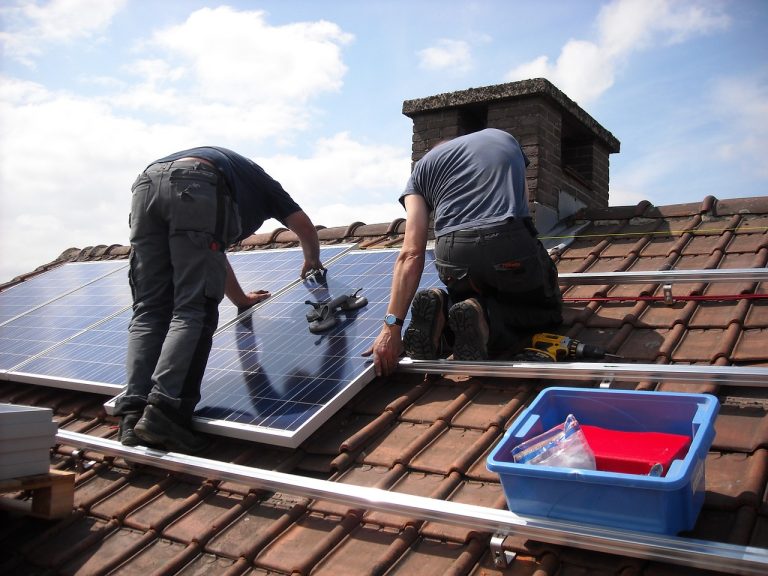Solar panels used to be a niche product that you hardly ever saw except on government buildings. Now they are everywhere.
They are touted as the best way to generate renewable energy on a small scale. But are they?
Can solar panels really help you save on energy bills?
Let’s find out!
How much do solar panels cost?
First, let’s cover the overall costs of a solar panel setup.
You have two main options, solar panels on their own or solar panels with batteries.
Solar panels on their own cost less but you won’t store any electricity and will need to use grid energy at night. You’ll sell it back to the grid though.
Solar panels with batteries store generated energy for darker days and nighttime. The setup is more expensive but covers your energy needs 24/7.
The average solar panel installation costs between £5,000 and £10,000 depending on the size and complexity.
Add batteries and you add between £3,000 and £4,000 to the cost of the installation.
Do solar panels make financial sense?
Solar panels haven’t always made financial sense but they do now. A combination of cheaper panels and rising energy bills has altered the maths more into our favour.
While not cheap by any means, solar panels are less expensive than they once were. They are also more efficient, generating more energy per panel.
If you can generate excess energy, the Smart Export Guarantee (SEG) pays you a little for what you feed into the grid.
It isn’t as generous as the old Feed In Tariff (FIT), but it’s better than nothing.
If your home uses a lot of electricity, solar panels could make financial sense. Depending on your usage, you could easily safe upwards of £500 per year on energy.
The higher your usage, the more you could save. The more panels you’ll need to create that energy though.
This solar energy calculator from the Energy Savings Trust should give you a good idea whether the maths work for you.
How do I pay for my solar panels?
There are two main ways to pay for solar panels. One is to partner with a company that subsidises or pays for all the panels in return for the money you make from SEG.
That agreement will usually be for 10 or 20 years.
The advantage is that you get to save on energy without having to spend several thousand on panels.
The downside is that you don’t really own the panels until the contract is complete and won’t benefit from the SEG payments.
I don’t recommend this type of arrangement unless you really want to go solar.
Paying for your own solar panels
It is far better to pay upfront from your solar panels. It’s the harder, more expensive path but it’s also the one that offers the most freedom and the return from SEG.
There are grants available in some areas to cover some of the cost but the rest will be up to you.
Whether it’s a good idea or not in your situation depends on how much electricity you use, how much you’re paying for it and whether you could generate enough to cover costs.
Breaking even
The average break even point for solar panels is around 10 years. That will be longer if you have a solar battery system.
That means it will take at least that long for the panels to pay for themselves and before you begin making an actual profit.
Remember, you’re still saving on energy and producing renewable energy during this time. You’re just not making a profit from it just yet.
You are making savings by not paying for electricity though.
The more you’re paying for electricity, the faster you’ll break even.
Other benefits of solar panels
Solar panels have other benefits aside from the purely financial.
They can:
Generate clean renewable energy
While your solar panel installation won’t reduce our dependence on fossil fuels on its own, it contributes to it. If we all used panels, we would need fewer power stations.
Reliable energy supply
It’s not exactly a secret that the National Grid is struggling to keep up with demand. That isn’t going to improve anytime soon.
Generating your own energy means you’ll always have access to some electricity, during daylight hours at least.
Insulation from market upheavals
Russia’s invasion of Ukraine taught us that globalisation isn’t all good and that depending on others for our energy security can work against us.
You can insulate yourself from that to a degree with solar panels. Generate your own energy and you know you’ll have electricity during daylight hours and won’t have to worry about events outside your own control.
Those are just 3 extra benefits of solar panels. I’m sure you can think of more!
So, can solar panels help you save on energy bills?
In the current financial climate where energy costs more, yes, solar panels can help you save on your energy bills.
They also help you generate clean renewable energy, provide energy independence and insulate you from further upheaval in the energy market.
For all those reasons, they are a good idea as long as they work for your individual circumstances.
I would strongly recommend consulting with a solar expert though, just to make sure!

